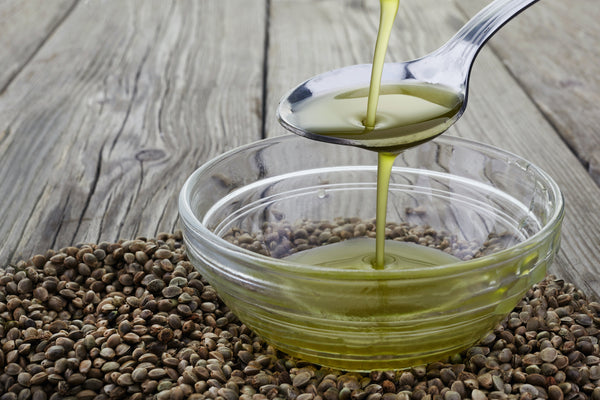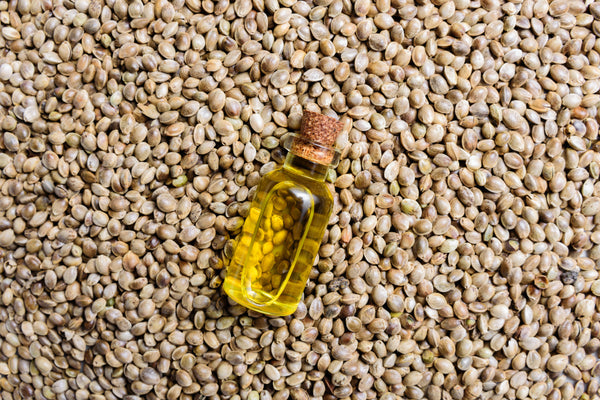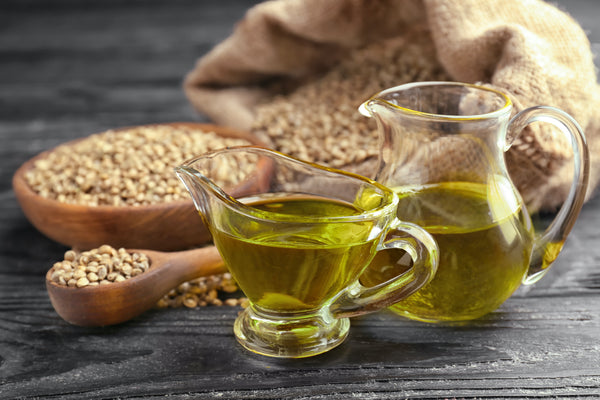Hemp seed oil is the most versatile and nutrient-dense oil one can use and offers a plethora of health benefits. Perhaps the most exciting fact about hemp seed oil is that it contains a perfect 1:3 ratio of omega-3 to omega-6 essential fatty acids.
At Ananda Food, we cultivate our own high-quality hemp seeds and then cold-press them to obtain this nutritious golden oil. We use a proprietary filtration technique that removes any impurities while keeping the diverse nutrient profile fully intact.
Our cold-pressed hemp seed oil is light green, with a delicious nutty flavor. Chlorophyll and some carotenoid pigments found in hemp seeds provide the light green color to our oil.

This ratio is deemed by health experts and scientists as ideal for promoting overall health and wellness and does not naturally occur in any other food. Check out the omega-3 to omega-6 ratios in conventional oils:
- Palm Oil: 1:45
- Olive Oil: 1:13
- Canola Oil 1:2
- Grape Seed Oil: 1:696
- Avocado Oil: 1:13
- Butter: 1:9
- Corn Oil: 1:46
- Cottonseed Oil 1:257
- Soybean Oil 1:16
Modern diets tend to provide massive amounts of omega-6, with very little omega-3. When an imbalance of fatty acid intake exists in our bodies, it causes a host of potentially dangerous health problems. Not only does hemp seed oil provide omega-3 and omega-6 in a perfect ratio, but also harder to find fatty acids like omega-7 and omega-9.
Here are all the beneficial fatty acids found in hemp seed oil:
Omega-3
- Alpha Linolenic Acid (ALA)
- Stearidonic Acid
Omega-6
- Linolenic Acid (LA)
- Gamma Linolenic Acid (GLA)
Omega-7
- Palmitic Acid (precursor to palmitoleic acid)
- Palmitoleic Acid
Omega-9
- Oleic Acid
- Cis-11-Eicosenoic Acid
ALA and LA are technically the only essential fatty acids, as the body cannot synthesize them and, therefore, must obtain them from a dietary source. The body can create DHA and EPA from ALA and LA.
This conversion process is more efficient in women than men (perhaps to ensure the child's health during pregnancy/breastfeeding, as developing brains require the most DHA). Research suggests that as little as 5-21% of ALA converts into EPA, and a mere 1-9% to DHA.
Omega-3 and omega-6 fatty acids compete with the same enzyme for conversion to DHA, EPA, and other compounds. This means that if you're overeating omega-6, the enzyme will be saturated, leaving no way for the body to utilize omega-3. This imbalance is terrible for all facets of health, and as such, ingesting the proper balance is vital.

Stearidonic Acid, rare in food but found in hemp seed oil, helps to enhance this conversion process, as it does not rely on the same rate-limiting enzyme, and can freely convert to EPA and DHA.
Gamma Linoleic Acid is considered 'conditionally essential,' meaning that your body requires more or less of it, depending on the stressors present in your life, genetics, lifestyle habits, nutrition, and more.
Palmitoleic Acid may help increase satiety, meaning you’ll feel fuller for longer. Studies show that Palmitoleic Acid reduces food consumption and promotes the release of satiety hormones in rats. Additionally, omega-7s like Palmitoleic Acid may benefit cholesterol levels, increase fat burning, and enhance insulin sensitivity.
Oleic Acid, an omega-9 fatty acid found in hemp seed oil, also has numerous benefits to human health. Research suggests that insufficient intake of monounsaturated fats (like Oleic Acid) may be a primary cause of cognitive decline. Oleic Acid also supports healthy blood sugar levels, blood pressure, cellular signaling, cholesterol, and weight management.
Hemp Seed Oil and Endocannabinoid Production
The body requires essential fatty acids to produce many vital substances, including:
- Endocannabinoids
- Anandamide
- 2-AG
- DHA-5HT
- DHA-DA
- DHA-EA (synaptamide)
- DHG
- Eicosanoids (inflammation regulators)
- Hepoxilins (influence nervous system, insulin secretion, and circulation)
- Lipid Rafts (crucial for cellular membrane fluidity and neurotransmission)
- Lipoxins (modulator of CB2 receptor that enhances anandamide activity)
- Epoxyeicosatrienoic Acids (can increase axon growth in neurons, as well as cell growth)
You read that right - without the proper essential fatty acids in your diet, your body cannot manufacture cannabinoids. And as we now know, Clinical Endocannabinoid Deficiency is at the root of several chronic health conditions that were previously thought untreatable.
More Nutrients in Hemp Seed Oil

Hemp seed oil also contains the following health-promoting nutrients:
- Vitamin E
- Carotene (precursor to VItamin A)
- Phytosterols (good for healthy cholesterol)
- Phospholipids (building blocks for cellular membranes)
- Calcium
- Magnesium (the ‘relaxation mineral’ that most people are deficient in)
- Sulfur
- Potassium
- Iron
- Zinc
- Chlorophyll (alkalizing)
- Arginine (relaxes and dilates blood vessels)
- Amino acids (all essentials)
No other oil on Earth can claim even close to this level of nutrition. Adding hemp seed oil to your foods could almost be called taking a natural multivitamin. This is not to mention that using hemp seed oil promotes the cultivation of hemp - a plant with hundreds of uses and unrivaled sustainability.
Hemp Seed Oil Benefits for Skin and Hair Health
Hemp seed oil is a phenomenal remedy for skin, increasing moisture, and overall skin health.
Omega-7s, exotic and hard to find fatty acids, may increase the synthesis of elastic and collagen - foundational elements of the skin that keep it strong, supple, and healthy, reducing the appearance and development of wrinkles.
We have found that hemp seed oil gives even the best beard oils a run for their money. Use as a leave-in conditioner, or rub down your body after a shower for a radiant glow.
Does Hemp Seed Oil Contain Cannabinoids like THC and CBD?
Understandably, people are often curious as to whether or not hemp seed oil contains cannabinoids. The answer is most often no, although improper handling could theoretically contaminate hemp seed oil with cannabinoids from the flowers and leaves. Ananda Food hemp seed oil is free from all cannabinoids, including CBD and THC.
Please Note: Many suggest that hemp seed oil is not for use above 200ºC (392ºF); excessive heat may result in the production of trans-fatty acids, aldehydes, and rancidity. Use hemp seed oil as a flavor-enhancer and potent nutrient boost on salads, sandwiches, and other foods - but maybe not as a substitute for high-temperature cooking oils.
However, data gathered by scientists Molleken and Theimer (who exposed hemp seed oil to a series of heat treatments before analyzing the fatty acid composition), demonstrated that the stability of hemp seed oil is much better than generally assumed. No trans-fatty acids were formed under normal cooking conditions, and heated hemp seed oil was very stable up to temperatures as high as 250°C (482ºF) most likely because of the significant levels of the antioxidant Vitamin E.
Keep hemp seed oil tightly sealed after opening and store in the refrigerator or freezer (hemp seed oil remains a liquid even at freezing temperatures).

